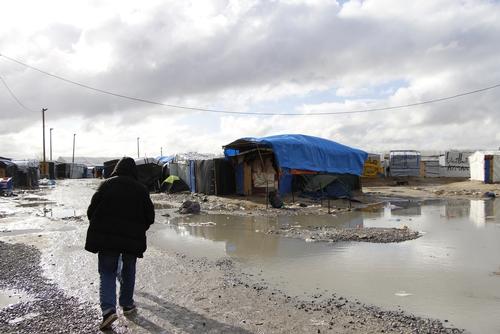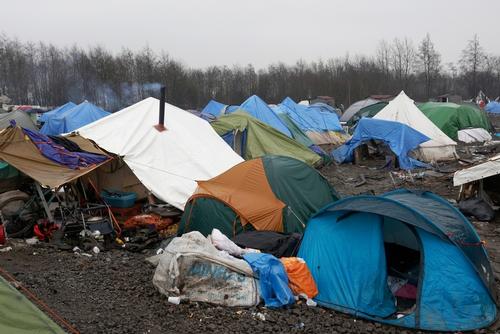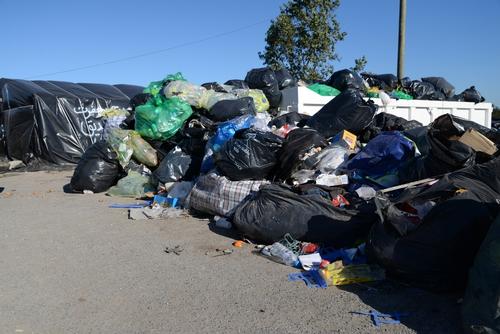It’s icy cold, wet and very windy in Calais. And it feels even colder for thousands of asylum seekers living there, dreading an uncertain future.
In the past few days, they’ve heard rumours that the tents in the south of the so-called Jungle migrant camp are going to be removed, and that the migrants are going to be forcibly fingerprinted in France.
Since the reports first emerged, some Sudanese have, with a heavy heart, decided to apply for asylum in France. Other refugees from Syria and Iraq left France for Germany and Sweden, where they believe they will be welcome. Some Syrian Kurds and Arabs have moved to the nearby Grande Synthe camp, where people live in muddy, rainy conditions and with little to no access to basic services.
A handful have heeded the call of the French authorities to move into pre-fabricated shelters dubbed containers, and away from the tents. But most of the Jungle’s many thousand residents haven’t decided what they’re going to do, if it turns out that the end of their camp’s lifetime is near.
Many of the migrants here say the reason why they so desperately want to cross the Channel to Britain is to join family there. Meanwhile, they brave grim living conditions, leading an existence plagued with frustration, waiting for the day when a smuggler can get them across at an exorbitant cost.
“The wind tears down our tents. Whenever there's a storm, it blows our tents down,” said Mohammad, a 21-year-old man who fled Syria’s war. “This is how we live. Since when do people in modern Europe live like this? They put us in camps without decent food. We just sit around. We count the days. It’s a slow death.”
They put us in camps without decent food. We just sit around. We count the days. It’s a slow death.
Mohammad says he is willing to risk his life by taking a ride in a refrigerated truck to Britain. “Maybe I’ll die, but I’m dying here anyway,” he said.
Tough days
Now, with heightened tension in the Calais area, many asylum seekers believe that “the UK is closed”. It used to cost £5,000 to £6,000, but now, perhaps because of heightened security, it costs at least £10,000. Many people don’t have that much, and they are giving up.
But there are few options open to people living a life in limbo. They wonder whether the fact that the authorities fingerprint people who agree to live in the containers might affect a future request for asylum in Britain.
People are also reticent about moving to the containers because they know they won’t feel free there – it is surrounded by a fence, and its residence live under constant surveillance, with rule upon rule marring their daily lives. The authorities have installed new toilets and running water there, but people want to be able to cook, and the fact that they need to register every time they return from the outside world makes it harder to move freely. Visitors, also, are not allowed.
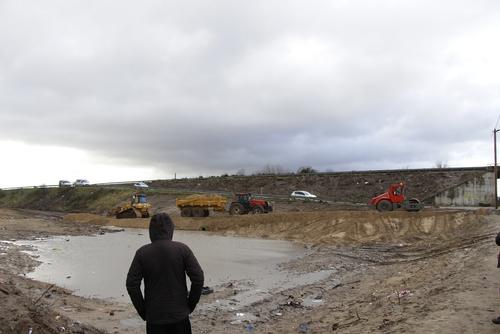
“Look at that. It reminds me of a film I saw back in Sudan about the Nazi detention camps during World War II,” said Omar, a 22-year-old asylum seeker from Darfur.
These are tough days for migrants in the Calais area; they are scared of many things. Not just of the police, or of the possibility that the camp might be razed. They are also scared of the locals. Some people have been beaten by civilians in the city or on the highway. They are afraid of everyone now, even those who are trying to help. And many believe that the French police condone such attacks, and so they don’t feel like there is anyone there to protect them.
This week, the government’s bulldozers – which are escorted by police – did not remove any tents. People in the Jungle think that they have until the end of this week to move to the containers, or to leave the Jungle altogether. But they don’t know whether the information they have received is accurate, so they live in fear.
Since last month, police have stopped patrolling inside the Jungle, but there is a heavy police presence with many police vans around the camp, and officers prevent anyone from coming anywhere near the highway. They start with warnings and then they launch tear gas. And they are always ready to fire tear gas.
‘Right to decide’
Mamoun, also from Syria, criticised Britain and France for not allowing people to be reunited with relatives on the other side of the Channel.
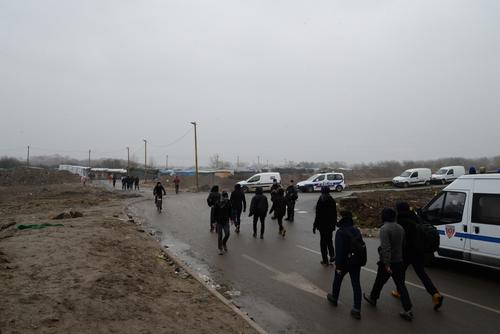
“We have the right to decide where we want to live,” he said. “We should at least have the right to be with our families in Britain. Rather than spend so much money on preventing us from reaching Britain, the authorities should spend it on creating a way to allow us safe passage.”
Many migrants interviewed by MSF have said the main reason why they don’t want to settle for asylum in France is because of the way they have been treated by police in Calais.
People are frequently subjected to several kinds of violence, including tear gas assaults and beatings, around the camps — and it isn’t just the people who try to slip into trucks heading to Britain. It has also happened to people walking in the city or on the highway.
This contrasts sharply with the kind treatment that migrants in the camp have received from British volunteers who come to Calais just to lend a helping hand. Their visits have made some of the asylum seekers even more convinced that they need to get across to Britain.
“It's tough here. There's nothing that makes you want to seek asylum here in France. They talk about safety, but where's the safety here?” says Ahmad, aged 25. “And when there are a lot of trucks on the highway, and people try to get on, the police come and start beating us. They fire tear gas at us. It burns. It's very violent. So we all run back down to our tents, and the police fire tear gas at us and our tents.”
Also, people fear that should they apply for asylum in France, they would have a very tough time finding work here. They also have trouble because of the language barrier.
“There's nothing that makes you want to seek asylum here. There’s nothing, it’s all just empty talk,” Ahmad said.




